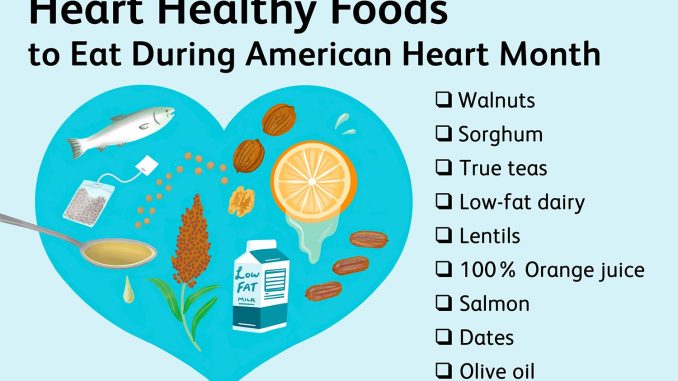
Heart disease remains one of the leading causes of death worldwide. However, a significant portion of cardiovascular risk can be managed or even prevented through lifestyle choices—especially diet. What we eat directly impacts the health of our heart and blood vessels, influencing cholesterol levels, blood pressure, inflammation, and overall cardiovascular function.
Choosing heart-healthy foods isn’t about restrictive dieting but about embracing nutrient-rich options that promote a strong, well-functioning cardiovascular system. This article explores some of the best foods that support heart health, why they matter, and how to incorporate them into your daily meals.
Why Diet Matters for Heart Health
Your heart works tirelessly to pump blood through your body, delivering oxygen and nutrients to your tissues. To perform efficiently, the heart and blood vessels require clean arteries, balanced cholesterol, and controlled blood pressure.
Poor dietary habits—high in saturated fats, trans fats, excess sodium, and added sugars—can cause plaque buildup in arteries (atherosclerosis), raise bad cholesterol (LDL), and lead to high blood pressure, all major risk factors for heart attacks and stroke.
Conversely, eating a diet rich in fruits, vegetables, whole grains, lean proteins, and healthy fats helps:
-
Lower LDL cholesterol
-
Reduce inflammation
-
Improve blood vessel function
-
Maintain healthy blood pressure
-
Support weight management
Top Heart-Healthy Foods
1. Fatty Fish
Fatty fish such as salmon, mackerel, sardines, and trout are packed with omega-3 fatty acids—essential fats that your body can’t produce on its own. Omega-3s reduce triglycerides (a type of fat in the blood), lower blood pressure, reduce blood clotting, and decrease inflammation.
Incorporate fatty fish into your diet at least twice a week by grilling, baking, or broiling. For vegetarians, flaxseeds, chia seeds, and walnuts offer plant-based omega-3s, though in a less potent form.
2. Leafy Green Vegetables
Spinach, kale, swiss chard, and collard greens are nutritional powerhouses rich in vitamins, minerals, and antioxidants. They contain high levels of nitrates, which help improve blood flow and reduce blood pressure.
These veggies also provide potassium, which balances out the negative effects of sodium and supports healthy blood vessel function. Aim to fill half your plate with a variety of colorful vegetables at every meal.
3. Whole Grains
Whole grains such as oats, brown rice, quinoa, barley, and whole wheat contain fiber, particularly soluble fiber, which helps reduce LDL cholesterol. They also help regulate blood sugar and insulin levels, which play a role in heart health.
Starting your day with oatmeal or swapping white bread for whole-grain alternatives are easy ways to boost your intake.
4. Nuts and Seeds
Almonds, walnuts, pistachios, flaxseeds, and chia seeds are excellent sources of healthy fats, fiber, and plant-based protein. Walnuts are especially rich in omega-3 fatty acids.
Regular nut consumption has been linked to lower LDL cholesterol and improved artery health. A small handful (about 1 ounce) daily is a heart-healthy snack that can also help with satiety.
5. Berries
Berries—such as blueberries, strawberries, raspberries, and blackberries—are loaded with antioxidants and fiber. These compounds help reduce inflammation and oxidative stress, which can damage blood vessels.
Studies show that regular berry consumption is associated with lower blood pressure and reduced risk of heart disease.
6. Legumes
Beans, lentils, chickpeas, and peas are nutrient-dense, high in protein, fiber, and various vitamins and minerals. The soluble fiber in legumes can help lower cholesterol, while their low glycemic index supports stable blood sugar.
Replacing some animal protein with legumes can also reduce saturated fat intake.
7. Olive Oil
Extra virgin olive oil is a cornerstone of the Mediterranean diet, widely praised for heart health benefits. It contains monounsaturated fats and powerful antioxidants that improve cholesterol levels and reduce inflammation.
Use olive oil as your primary cooking oil or in salad dressings to maximize benefits.
8. Dark Chocolate
In moderation, dark chocolate (with at least 70% cocoa) offers flavonoids that may improve blood flow and lower blood pressure. These antioxidants also help protect your arteries from damage.
Limit intake to a small piece daily and avoid sugary milk chocolate versions.
9. Avocados
Avocados are rich in monounsaturated fats, potassium, and fiber, all of which support healthy cholesterol levels and blood pressure. They also contain antioxidants and anti-inflammatory compounds.
Add avocado slices to salads, smoothies, or toast for a creamy, nutritious boost.
Foods to Limit or Avoid
While focusing on heart-healthy foods, it’s equally important to reduce or avoid:
-
Trans fats: Found in many processed foods and baked goods, they raise LDL and lower HDL cholesterol.
-
Excess sodium: High salt intake raises blood pressure; aim to keep sodium below 2,300 mg daily (ideally 1,500 mg).
-
Refined carbs and added sugars: These contribute to inflammation, obesity, and increased heart disease risk.
-
Excess saturated fat: Primarily from fatty cuts of meat, full-fat dairy, and certain processed foods; choose lean proteins and low-fat dairy instead.
Practical Tips to Eat for Your Heart
-
Plan meals around plants: Make vegetables, fruits, legumes, nuts, and whole grains the foundation of your meals.
-
Cook at home: This helps you control ingredients, limit salt and unhealthy fats.
-
Experiment with herbs and spices: Use garlic, turmeric, ginger, and cinnamon to flavor foods without salt.
-
Read labels: Watch for hidden sodium and unhealthy fats in packaged foods.
-
Balance indulgences: Enjoy treats like dark chocolate occasionally without guilt.
Conclusion
Your diet is one of the most powerful tools you have for maintaining a healthy heart. By prioritizing nutrient-rich, whole foods like fatty fish, leafy greens, nuts, and whole grains, you can reduce your risk of heart disease, improve cholesterol and blood pressure, and support overall cardiovascular function.
Small, consistent changes to your eating habits add up over time, helping you build a heart-healthy lifestyle that feels satisfying and sustainable. Start by introducing one or two heart-friendly foods into your routine today and watch the positive effects ripple through your health.